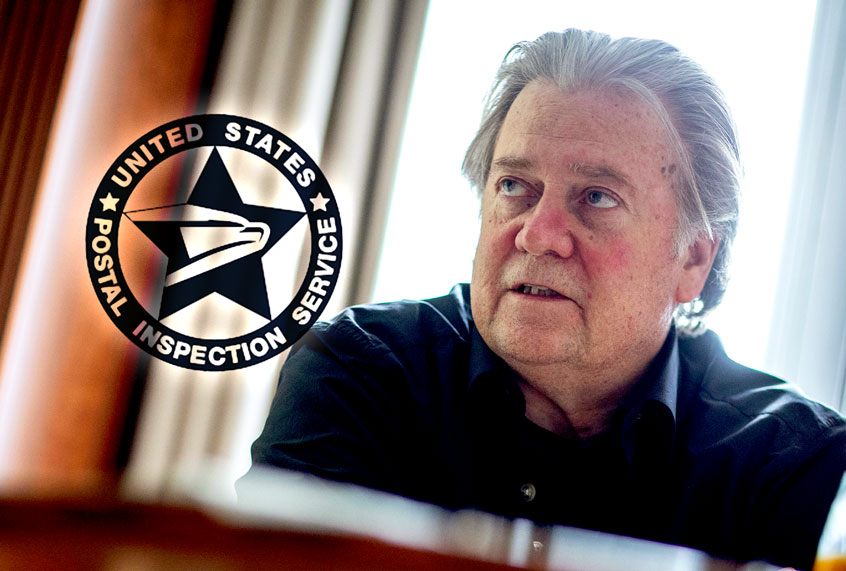When federal prosecutors charged former White House strategist Steve Bannon with fraud this week, they sent investigators working for the U.S. Postal Service (USPS) to cuff him.
Bannon was reportedly arrested Thursday by Postal Service agents while aboard a boat off the coast of Westbrook, Conn. He pleaded not guilty to the charges later that afternoon.
On Friday’s edition of his “War Room” podcast, Bannon called the arrest a “political hit job” in order “to stop and intimidate people” who support Trump’s wall on the U.S. southern border with Mexico.
“I’m not going to back down. This is a political hit job,” Bannon said. “Everybody knows I love a fight.”
Prosecutors indicted Bannon along with three co-conspirators on charges of money laundering charges and wire fraud. The charging document alleged that the four men skimmed off hundreds of thousands of dollars for personal use from an online crowdfunding campaign designed to help make Trump’s campaign promise to build a wall along the country’s southern border with Mexico a reality.
“As alleged, the defendants defrauded hundreds of thousands of donors, capitalizing on their interest in funding a border wall to raise millions of dollars, under the false pretense that all of that money would be spent on construction,” Audrey Strauss, the acting U.S. attorney for the Southern District of New York, said in a statement.
Strauss acknowledged the Postal Inspectors department — or USPIS — in her statement: “We thank the USPIS for their partnership in investigating this case.”
USPS Inspector-in-Charge Philip R. Bartlett said in a joint statement that the defendants showed “no regard for the law or the truth.”
“As alleged, not only did they lie to donors, they schemed to hide their misappropriation of funds by creating sham invoices and accounts to launder donations and cover up their crimes, showing no regard for the law or the truth,” Bartlett said.
“This case should serve as a warning to other fraudsters that no one is above the law — not even a disabled war veteran or a millionaire political strategist,” he added.
The USPS’ involvement in Bannon’s arrest provides a stunningly ironic twist given that President Donald Trump — on whose campaign Bannon served as chief executive in 2016 — has spent months claiming, without evidence, that mail-in ballots invite widespread fraud and election interference.
Though it remains unclear what role the USPIS played in the Bannon investigation, the indictment at one point refers to the alleged creation of fraudulent invoices related to a non-profit operated by Bannon and a shell company under the name of one of his co-defendants.
The USPIS is the law enforcement, crime prevention and security arm of the Postal Service. Postal inspectors are federal law enforcement agents who investigate postal-related crimes — e.g., child exploitation conducted via mail, crimes against agency workers, mail fraud and theft, threats made by mail and the shipment of contraband. The service boasts about 1,200 agents, who are authorized to carry weapons, serve subpoenas, make arrests and execute federal search warrants.
Inspectors investigated 576 reported threats and assaults against postal employees during 2019, making 247 arrests that resulted in 154 convictions, according to Postal Service data. They also executed 2,562 arrests for illegal-narcotics related cases.
A weekly CBS TV series called The Inspectors was based on real-life USPIS cases, but got pulled in 2019 after four seasons.
In a statement to Salon, an agency spokesperson said the division’s mission is “to ensure America’s confidence in the U.S. Mail by enforcing more than 200 federal statutes involving crimes that may adversely affect postal customers or fraudulently use the U.S. Mail or the postal system.”
“The U.S. Postal Inspection Service has been leading fraud investigations for over 100 years, since the mail fraud statute was enacted in 1872,” the USPIS spokesperson said. “Our mission is to protect U.S. Postal Service customers, employees and infrastructure from fraud and other illegal activity. We will continue this mission today and for future years to come. In order to preserve the integrity of our investigations and to prevent fundamental unfairness to the subjects of those investigations, the U.S. Postal Inspection Service does not comment on ongoing investigations.”
Trump appeared to publicly admit that he opposed supplemental congressional election funding for the beleaguered agency in order to sabotage plans to expand voting by mail. The president’s Postmaster General Louis DeJoy has also been implicated by Congressional Democrats.
“They need that money in order to have the Post Office work, so it can take all of these millions of ballots,” Trump told Fox Business host Maria Bartiromo on Thursday. “If they don’t get those two items, that means you can’t have universal mail-in voting. Because they’re not equipped.”
Numerous recent reports have detailed how policy changes handed down under DeJoy have cut overtime and slowed down mail delivery across the country. Speaker of the House Nancy Pelosi, D-Calif., and Senate Minority Leader Chuck Schumer, D-N.Y., said in a letter to DeJoy last week that he had “confirmed that contrary to prior denials and statements minimizing these changes, the Postal Service recently instituted operational changes” shortly after he assumed office.
Those changes, they said, “now threaten the timely delivery of mail — including medicines for seniors, paychecks for workers, and absentee ballots for voters — that is essential to millions of Americans.”
And can we all take a moment to relish the sweet irony that Bannon was taken into custody by US Postal Service Agents. Through rain, sleet, snow, and worse they deliver medication, paychecks, absentee ballots … and JUSTICE! https://t.co/XLnPRC92QW
— Jackie Speier (@RepSpeier) August 20, 2020

